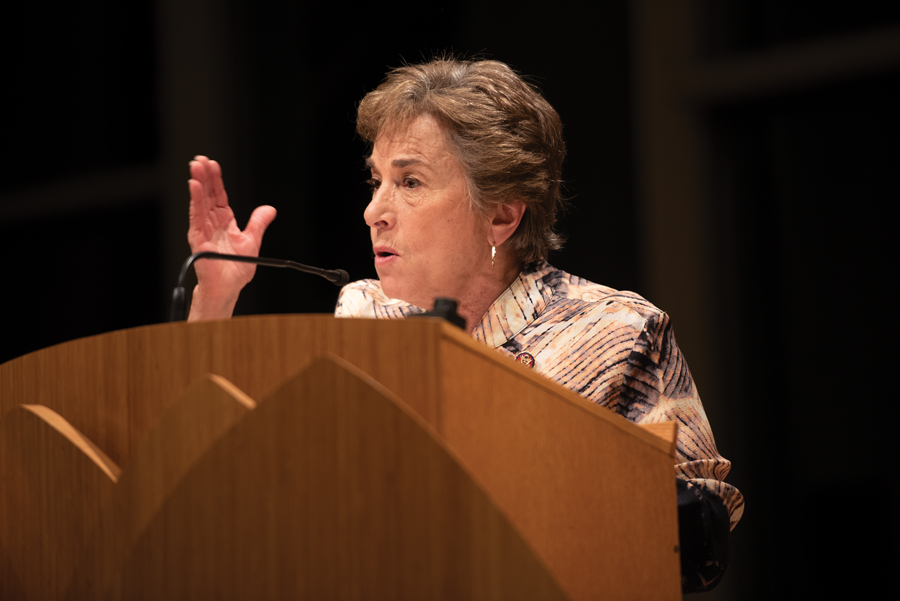Evanston community members analyze impacts of endorsements on Democratic primary
Daily file photo by Jacob Fulton
Rep. Jan Schakowsy (D-Evanston). Schakowsky has endorsed Sen. Elizabeth Warren (D-Mass) in the Democratic presidential primary.
February 17, 2020
In elections, endorsements mean everything — at least, that’s what candidates seem to believe.
In competitive primaries for House or Senate seats, a presidential endorsement can be the difference between winning a party nomination and going home empty-handed. Even though they may not have the presidency — or even a nomination — yet, potential presidential candidates also endorse races across the country that they feel exemplify their policies.
Locally, U.S. Rep. Jan Schakowsky (D-Evanston) has endorsed U.S. Sen. Elizabeth Warren (D-Mass.) for president. Since her Nov. 30 endorsement, she has continued to voice her support, speaking at multiple events in favor of Warren. Mayor Steve Hagerty has also publicly endorsed Mayor Pete Buttigieg, signing a Sept. 18 editorial with more than 50 other mayors across the country in support of the candidate.
Political science Prof. Tabitha Bonilla said presidential endorsements from newspapers, celebrities and other elected officials seem to carry a certain level of political influence for campaigns. In a crowded field, she said strong endorsements can set candidates apart from the rest, though they don’t always do so. Former Vice President Joe Biden, for example, has received 86 endorsements from prominent political figures, according to FiveThirtyEight, yet came in 4th and 5th in the Iowa and New Hampshire primaries, respectively.
Bonilla said elected officials have to consider their constituencies in their endorsements to an extent, so endorsements across party lines are few and far between. However, within the party, she said ideological differences are less likely to harm a representative’s electability.
“In a primary, even though there are some really important differences between the candidates, there’s also a lot less between them compared to the other party,” Bonilla said. “So there’s some safety within a primary, even if a representative’s constituents aren’t necessarily all on board. If they have a significant portion of voters to their left or right, I don’t think it would be a problem for most people.”
Bonilla said endorsements play two roles within a community: they can guide low-information voters whose opinions align with their elected officials to a possible candidate to support, and they can also show widespread support for campaigns. She said President Donald Trump used this strategy in 2016 in an attempt to gain credibility amongst a large pool of candidates.
For Schakowsky, the choice to endorse Warren was based on multiple factors. She said her personal experiences with the candidate proved her merit, and her progressive policies aligned with Schakowsky’s view of what Evanston represents.
“There are definitely some Bernie supporters, and definitely some Buttigieg supporters, so it’s interesting to see that there are a few people supported in Evanston for this election,” Schakowsky said. “However, I do feel the match of the Democratic Party of Evanston and Elizabeth Warren is the best one that we have.”
Schakowsky said she thought it was important as a leader in Evanston for her to endorse Warren, because she agrees with the candidate’s message so strongly.
Evanston resident Peter Gann said he feels there is a strong chance Schakowsky’s endorsement may sway voters across the city, as she has made herself an integral part of the community for years.
“Jan Schakowsky is highly respected in Evanston — she’s a resident of Evanston, people know her, she’s been the congressional representative for years,” Gann said. “I’m a physician, and I’m a very big proponent of a single-payer Medicare for all system. For a long time, Jan Schakowsky was kind of on the fence about that, but when she came out and endorsed Elizabeth Warren, I was extremely pleased.”
However, it may be difficult to measure the impact Schakowsky’s endorsement will have on Evanston. Support for candidates is often tested through polls, especially in early primary states. Because Illinois doesn’t hold its primary until March 17 — after Super Tuesday, on March 3, which is the make-or-break point for many campaigns — it is harder to determine the state’s candidates of choice, because polls are infrequent. According to FiveThirtyEight, only two presidential polls have taken place in the state since the start of 2019.
As a result, local organizations such as the Democratic Party of Evanston hold events like its Feb. 9 endorsement session, where members vote for their favorite candidates. As a result, the group can get a sense of which potential nominees have a chance at winning the district. At the event, U.S. Sen. Bernie Sanders (I-Vt.) was the most frequent first choice, followed by Warren, U.S. Sen. Amy Klobuchar (D-Minn.) and Buttigieg.
However, Gann said the event isn’t necessarily an accurate representation of Evanston’s views, as the over 200 participants are a self-selected group that tends to skew toward being more politically involved. As a result, he said the endorsement session should be taken with a grain of salt, as other members of the community may not share the views of the DPOE members who attended, and the primary is the only true way to understand who Evanston supports.
“Evanston is going to be split, just like many parts of the country,” Gann said. “This is not a cross section of Evanston. These are the people who are most politically engaged; the most informed. They tend to be more educated and more wealthy. I have no idea how it’s going to turn out.”
Email: jacobfulton2023@u.northwestern.edu
Twitter: @jacobnfulton1
Related stories:
– DPOE holds ranked choice voting session for presidential, local candidates
– The Ripple: DPOE members, state representatives endorse presidential candidates



